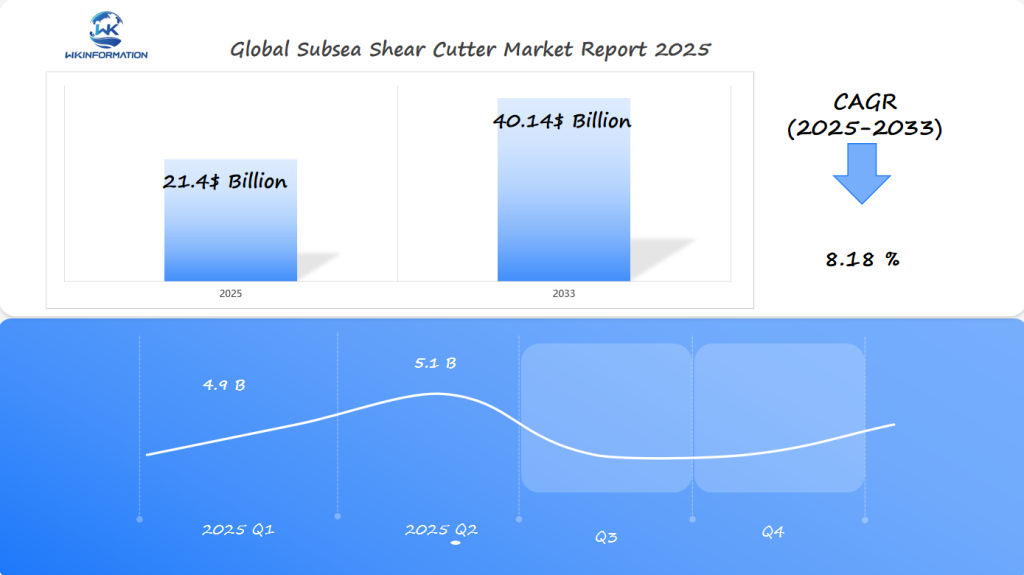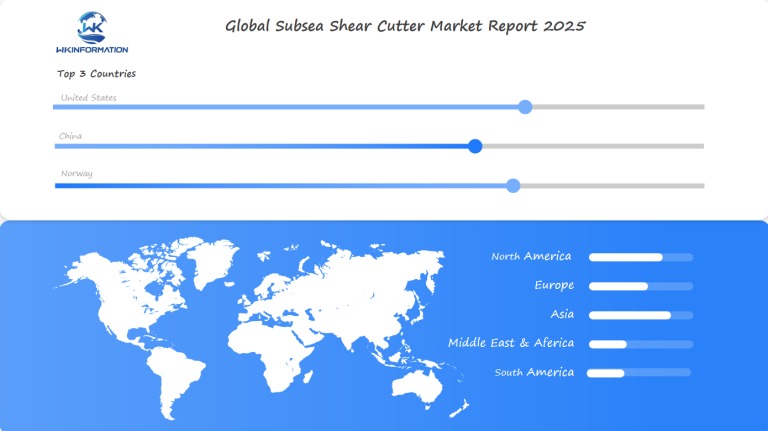Subsea Shear Cutter Market: Unlocking $21.4 Billion Potential in US, China, and Norway by 2025
Discover how the United States, China, and Norway lead the global subsea shear cutter market through innovation, rapid expansion, and regulatory excellence. Learn about technological advancements, market dynamics, and future trends in underwater cutting solutions for offshore energy operations. From installation to decommissioning, explore how these specialized tools shape the future of subsea operations while ensuring safety and environmental protection.
- Last Updated:
Subsea Shear Cutter Market Forecast for Q1 and Q2 of 2025
The subsea production and processing industry, which includes subsea shear cutters, is expected to reach USD 21.4 billion in 2025, with a strong growth trajectory driven by technological advancements and increased offshore exploration. In Q1 of 2025, the market is anticipated to generate around USD 4.9 billion, followed by a slight increase in Q2, which is expected to reach approximately USD 5.1 billion. With a compound annual growth rate (CAGR) of 8.18% from 2025 to 2033, the market will continue to expand, propelled by ongoing developments in subsea oil and gas fields. The United States, China, and Norway are the leading countries to monitor in this space, as they hold substantial offshore reserves and are heavily investing in subsea technologies.
The United States continues to lead in technological innovation, while China’s growing energy demand pushes advancements in subsea production. Norway, with its mature subsea oil industry, remains a key player in shaping market dynamics. The expanding demand for subsea shear cutters will be closely tied to these nations’ efforts to enhance offshore productivity. For deeper insights into these trends and a comprehensive market overview, explore the Wkinformation Research sample and full report today.

Upstream and Downstream Industry Chain Analysis: The Subsea Shear Cutter Supply Chain Explained
The subsea supply chain is a complex network of processes. It drives the offshore equipment manufacturing sector. To understand underwater cutting technology, we must look at each stage in the production ecosystem.
Raw Material Suppliers and Component Manufacturers
Choosing the right raw materials is key in making subsea shear cutters. Manufacturers use metals and alloys that can handle extreme underwater conditions. Some important materials include:
- Corrosion-resistant stainless steel
- Titanium alloys
- Advanced polymers
- Specialized ceramic composites
Assembly and Integration Processes
The manufacturing process needs precision engineering and strict quality control. Advanced techniques are used to make sure underwater cutting technology works well.
Precision is the cornerstone of effective subsea equipment manufacturing.
| Manufacturing Stage | Key Focus Areas | Quality Parameters |
|---|---|---|
| Component Fabrication | Material Selection | Corrosion Resistance |
| Precision Machining | Dimensional Accuracy | Mechanical Strength |
| Assembly Integration | System Compatibility | Operational Reliability |
Distribution Channels and End-Users
The last part of the supply chain is getting the products to where they need to go. The main users are offshore oil and gas companies, marine research groups, and teams that maintain underwater infrastructure.
- Offshore drilling corporations
- Marine engineering firms
- Underwater research organizations
- Pipeline maintenance services
Every part of the supply chain helps make underwater cutting technology reliable and innovative. This ensures solutions for complex marine tasks.
Trend Analysis: Innovations and Trends in Subsea Shear Cutter Technology
The world of subsea technology is changing fast, especially in underwater cutting. New technologies are changing how the offshore industry works underwater. This has led to big improvements in how equipment is made and works.
New smart subsea technology is bringing big changes to underwater cutting. Engineers are making systems that are more precise and work better in tough marine environments.
Advancements in Cutting Mechanisms
Modern subsea shear cutters are seeing big tech breakthroughs. Some key improvements include:
- Enhanced material durability for extreme underwater conditions
- Improved hydraulic system designs
- High-precision cutting algorithms
- Adaptive blade geometries
Integration of Smart Technologies
Smart subsea technology is changing underwater cutting. Artificial intelligence and machine learning are now used for real-time monitoring and predictive maintenance of subsea gear.
Eco-friendly and Sustainable Solutions
The offshore industry is focusing on green equipment. Makers are creating new solutions that are good for the environment and still work well. These innovations aim to use less energy and use recyclable materials in subsea shear cutter design.
Research is always pushing the limits of underwater tech. It promises even more advanced and eco-friendly solutions in the future.
Restriction Analysis: Challenges Facing the Subsea Shear Cutter Industry
The subsea shear cutter industry faces many challenges. These challenges test the resilience and innovation of offshore technology developers. They span regulatory, technical, and economic domains, making the market complex.
Regulatory Hurdles and Compliance Issues
Manufacturers of subsea shear cutters face big barriers. They must follow strict rules about the environment, safety, and international standards. Key challenges include:
- Stringent environmental impact assessments
- Complex international maritime regulations
- Safety certification requirements
- Cross-border operational permissions
Technical Limitations in Deep-Sea Operations
Deep-sea operations pose big technical challenges for subsea shear cutters. The extreme conditions require advanced engineering. Key challenges include:
- Pressure resistance at extreme depths
- Material durability in corrosive marine environments
- Communication and control system reliability
- Precision cutting mechanisms under challenging conditions
Economic Factors Impacting Market Growth
The growth of the subsea market is tied to the global economy. Fluctuating oil prices and investment levels affect the industry. Key economic factors include:
- Volatile energy market pricing
- Global economic uncertainty
- Research and development investment levels
- Competition from alternative technologies
To overcome these challenges, the industry needs continuous innovation and strategic investment. It must also adopt new technologies.

Geopolitical Analysis: The Impact of Global Politics on Subsea Shear Cutter Production and Trade
The offshore industry’s politics greatly shape the global market for subsea shear cutters. Political and economic strategies deeply affect technology, production, and trade in this field.
Global energy policies are changing the scene of international subsea trade. Countries see the value of advanced marine tech in staying ahead in the offshore world.
International Trade Agreements and Tariffs
Subsea shear cutter markets are linked by complex international trade systems. Important factors include:
- Bilateral trade agreements between major maritime nations
- Tariff structures affecting equipment importation
- Technology transfer restrictions
- Geopolitical risk assessments
Political Tensions and Market Access
Political ties affect how subsea tech reaches markets. Diplomatic issues can block trade, limiting tech exchange and market entry.
“Geopolitical considerations are increasingly determining the competitive landscape of offshore technologies.” – International Maritime Research Institute
Global Energy Policies and Their Influence
Changes in global energy policies are reshaping the subsea shear cutter market. Moves towards renewable energy and reducing carbon emissions are driving innovation. They open up new chances for advanced marine tech.
Investments in offshore infrastructure are guided by broader geopolitical plans. Countries aim to control key marine tech sectors.
Segmentation Type Market Analysis: Subsea Shear Cutter Market Segmentation by Type and Application
The subsea shear cutter market is a key part of offshore equipment. It covers many industries. Knowing how these tools are divided helps us see their tech and how they work.
Subsea cutters are sorted by important factors. These factors show how well they cut underwater.
Classification by Cutting Capacity
Underwater cutting needs the right tool for the job. There are different types based on how much they can cut:
- Light-duty cutters: Great for small, careful jobs
- Medium-capacity cutters: Good for most offshore tasks
- Heavy-duty cutters: Built for tough marine jobs
Segmentation by Operational Depth
How deep a tool can work is key:
- Shallow water systems (0-100 meters)
- Intermediate depth range (100-500 meters)
- Deep-sea configurations (500-3000 meters)
- Extreme deep-sea applications (3000+ meters)
Application-based Market Divisions
Subsea shear cutters are used in many important areas:
- Oil and gas exploration
- Offshore wind farm maintenance
- Underwater cable and pipeline management
- Marine research and scientific exploration
- Underwater construction and salvage operations
These detailed ways of sorting tools help match them with the right jobs. This leads to better tools and work in underwater cutting.
Application Market Analysis: The Role of Subsea Shear Cutters in Offshore Operations
Subsea shear cutters are key in modern offshore work. They change how we do underwater maintenance and manage underwater structures. These tools are vital in many marine fields, tackling tough underwater tasks.
The market for cutting in the sea is growing fast. New subsea maintenance tech makes underwater work more efficient and accurate.
Oil and Gas Exploration and Production
In oil and gas, subsea shear cutters are essential. They help with:
- Well intervention procedures
- Pipeline segment removal
- Infrastructure maintenance
Underwater Cable and Pipeline Maintenance
For sea communication and energy, precise cutting is crucial. Shear cutters help with:
- Repairing damaged underwater cables
- Making precise pipeline changes
- Checking infrastructure without damage
Marine Salvage and Decommissioning
Marine decommissioning is a big area for subsea shear cutters. The market is growing fast, with tools used for:
- Breaking down offshore platforms
- Removing underwater structures
- Helping with environmental cleanup
Thanks to new tech, subsea shear cutters are getting better. They offer advanced solutions for tough offshore problems.
Global Subsea Shear Cutter Market Region Analysis: Regional Market Dynamics
The global subsea market is changing fast. New trends in international underwater technology are emerging. Offshore industries around the world are seeing big changes thanks to new tech and market strategies.
Understanding the complex world of subsea shear cutter technologies requires looking at regional market dynamics. Each area has its own special traits and growth chances that affect the global market.
North American Market Landscape
The North American subsea market is strong in offshore work. It stands out because of:
- Advanced tech infrastructure
- Big investments in deepwater exploration
- Strong rules that support new ideas
European Offshore Industry Trends
European areas are known for their skill in underwater tech. They use advanced subsea engineering, especially in Norway and the UK.
Asia-Pacific Growth Opportunities
The Asia-Pacific region is full of chances for subsea market growth. New countries are putting money into offshore tech, leading to big growth.
| Region | Market Potential | Key Focus Areas |
|---|---|---|
| North America | High | Deep-sea exploration |
| Europe | Moderate | Technological innovation |
| Asia-Pacific | Rapidly Growing | Infrastructure development |
Looking at these regional trends gives us key insights into the changing global subsea market. It shows how international underwater tech development is connected.

United States Subsea Shear Cutter Market Analysis
The US subsea market leads in underwater cutting tech, driving innovation in offshore work. American tech has shown top-notch skills in making advanced subsea shear cutters. These meet tough industry standards.
Leading players in the American market have pushed tech limits. The underwater cutting rules have guided the making of complex cutting tools. These are for the harsh marine world.
Market Leaders and Technological Innovations
Several top U.S. makers shine in the subsea shear cutter field:
- Advanced Marine Technologies Inc.
- Ocean Dynamics Engineering
- SubSea Precision Solutions
Technological Advancements
New tech in American offshore tech has brought big changes:
- Enhanced material durability for extreme pressure environments
- Precision cutting mechanisms with better accuracy
- Smart sensor tech integration
Regulatory Landscape
The underwater cutting rules in the U.S. have grown more complex. They ensure safety and performance. Makers must follow strict rules from marine engineering bodies. This has led to constant tech betterment.
The U.S. subsea market is a key spot for tech innovation and strict rules in underwater cutting tech.
China Subsea Shear Cutter Market Analysis
The Chinese subsea industry is growing fast, leading to new underwater technology. China is now a big player in the global subsea shear cutter market. This is thanks to its focus on advanced underwater tech.
China’s underwater tech growth shows a strong national plan to boost maritime power. Several key factors help this market grow:
- Big government spending on offshore research
- Fast tech development programs
- More offshore exploration
- Strong manufacturing base
Rapid Growth and Market Expansion
Chinese makers are making top-notch subsea shear cutters. They offer good prices and new designs. This lets them compete with big names worldwide.
“China’s commitment to underwater technology represents a significant transformation in global maritime engineering.” – Maritime Technology Research Institute
Chinese Manufacturers and Global Competition
| Manufacturer | Market Strength | Technology Level |
|---|---|---|
| CMHI Offshore | High | Advanced |
| China Shipbuilding | Medium-High | Competitive |
| Offshore Technology Solutions | Medium | Emerging |
Government Initiatives and Support
The Chinese government backs the subsea tech sector a lot. Strategic funding, research grants, and policy incentives help make top underwater gear. This lets Chinese makers compete globally.
China keeps pushing for innovation and resources. This helps it grow in the world’s subsea tech market.
Norway Subsea Shear Cutter Market Analysis
Norway leads in subsea technology, pushing underwater operations forward with its expertise and research. Its rich maritime history and advanced tech make it a world leader in green underwater work.
The Norwegian offshore industry excels in subsea tech, focusing on innovation. They blend technical skill with care for the environment, creating new limits in underwater engineering.
Offshore Expertise and Technological Leadership
Key strengths of Norway’s subsea tech sector include:
- Advanced engineering capabilities
- High-precision underwater cutting technologies
- Robust research infrastructure
- Strong commitment to sustainable practices
Research and Industry Collaboration
Norwegian institutions have formed strong partnerships between research centers and manufacturers. These partnerships lead to better subsea shear cutter tech, solving tough underwater problems.
Sustainable Underwater Operations
Norway is a leader in green underwater work. The country invests a lot in eco-friendly subsea tech that’s good for the planet and works well.
With a 6.5% market growth rate, Norway holds about 20% of the global subsea shear cutter market. It shows Norway’s key role in underwater tech advancements.
Future Development Analysis: The Future of Subsea Shear Cutters in Deepwater Exploration
The world of underwater technology is changing fast. This brings new chances for exploring deep seas and using robots underwater. New tech is changing how we tackle tough sea challenges.
New tech is making subsea shear cutters better. Several big changes are happening in the field:
- Advanced materials making them last longer in harsh conditions
- AI control systems making them more precise
- Working with autonomous underwater vehicles for tough tasks
Emerging Technologies and Their Potential Impact
The next subsea shear cutters will use the latest tech to beat old limits. Intelligent sensor systems and AI will help with better underwater control.
Adaptation to Extreme Environments
Modern shear cutters can handle high pressure. They’re made with new materials for deep waters and tough seas. They use special composites and hydraulic systems to go further.
Integration with Autonomous Underwater Vehicles
Subsea shear cutters and underwater robots working together is a big step. These teams can explore complex seas, do detailed cuts, and send data fast.
Competitor Analysis: Major Players in the Subsea Shear Cutter Market
The subsea equipment makers are leading the way in underwater cutting tech. They are changing the game for offshore tech companies. As the need for better marine solutions grows, these leaders are fighting for market share.
Top names in the subsea shear cutter market stand out for their tech and new products. The competition is fierce among these offshore tech giants.
- Ashtead Technology – United Kingdom
- CS Unitec – United States
- Delta Subsea LLC – United States
- Global Marine – United Kingdom
- Helix Energy Solutions Group – United States
- Hiretech Limited – United Kingdom
- IKM Subsea – Norway
- Osbit – United Kingdom
- Seatools BV – Netherlands
- Allseas Engineering Technologies Applications Ltd. – Switzerland
Overall
| Report Metric | Details |
|---|---|
| Report Name | Global Subsea Shear Cutter Market Report |
| Base Year | 2024 |
| Segment by Type |
· 5t · 10t · Others |
| Segment by Application |
· Offshore Nuclear Energy · Offshore Oil and Gas · Others |
| Geographies Covered |
· North America (United States, Canada) · Europe (Germany, France, UK, Italy, Russia) · Asia-Pacific (China, Japan, South Korea, Taiwan) · Southeast Asia (India) · Latin America (Mexico, Brazil) |
| Forecast units | USD million in value |
| Report coverage | Revenue and volume forecast, company share, competitive landscape, growth factors and trends |
The subsea market is changing fast with new underwater cutting technologies. The offshore industry is growing thanks to new tech and more demand for complex underwater work. Investments in research and development are key to the future of underwater cutting worldwide.
Technological progress is changing the subsea shear cutter world. Companies are working on making cutting tools more precise, efficient, and green. The use of AI, robotics, and new materials will help with deeper sea work and maintenance.
Companies face big challenges like rules, the environment, and quick tech changes. Those that focus on innovation, being green, and being flexible will lead the market. They need to be quick to adapt to new needs and tech.
It’s smart to keep investing in research, team up with tech partners, and create flexible underwater cutting tools. Companies must also keep safety, the environment, and tech quality top priorities. This way, they can take advantage of new chances in the global subsea market.
Global Subsea Shear Cutter Market Report (Can Read by Free sample) – Table of Contents
Chapter 1: Subsea Shear Cutter Market Analysis Overview
- Competitive Forces Analysis (Porter’s Five Forces)
- Strategic Growth Assessment (Ansoff Matrix)
- Industry Value Chain Insights
- Regional Trends and Key Market Drivers
- Subsea Shear CutterMarket Segmentation Overview
Chapter 2: Competitive Landscape
- Global Subsea Shear Cutter players and Regional Insights
- Key Players and Market Share Analysis
- Sales Trends of Leading Companies
- Year-on-Year Performance Insights
- Competitive Strategies and Market Positioning
- Key Differentiators and Strategic Moves
Chapter 3: Subsea Shear Cutter Market Segmentation Analysis
- Key Data and Visual Insights
- Trends, Growth Rates, and Drivers
- Segment Dynamics and Insights
- Detailed Market Analysis by Segment
Chapter 4: Regional Market Performance
- Consumer Trends by Region
- Historical Data and Growth Forecasts
- Regional Growth Factors
- Economic, Demographic, and Technological Impacts
- Challenges and Opportunities in Key Regions
- Regional Trends and Market Shifts
- Key Cities and High-Demand Areas
Chapter 5: Subsea Shear Cutter Emerging and Untapped Markets
- Growth Potential in Secondary Regions
- Trends, Challenges, and Opportunities
Chapter 6: Product and Application Segmentation
- Product Types and Innovation Trends
- Application-Based Market Insights
Chapter 7: Subsea Shear Cutter Consumer Insights
- Demographics and Buying Behaviors
- Target Audience Profiles
Chapter 8: Key Findings and Recommendations
- Summary ofSubsea Shear Cutter Market Insights
- Actionable Recommendations for Stakeholders

Access the study in MULTIPLEFORMATS
Didn’t find what you’re looking for?
TALK TO OUR ANALYST TEAM
Need something within your budget?
NO WORRIES! WE GOT YOU COVERED!
Call us on: +1-866-739-3133
Email: infor@wkinformation.com
What are subsea shear cutters used for?
Subsea shear cutters are specialized tools designed for underwater cutting operations. They efficiently cut materials such as umbilicals, tubulars, and structural elements like beams and concrete. These cutters are essential in installation, maintenance, and decommissioning of offshore infrastructure.
How do subsea shear cutters operate?
These tools are typically deployed using Remotely Operated Vehicles (ROVs). They can be customized for specific applications and tailored to meet the demands of various underwater environments. The hydraulic variants offer enhanced precision and power.
Who are the leading countries in the subsea shear cutter market?
The United States, China, and Norway dominate this market. Each country contributes uniquely— the U.S. through innovation, China via rapid expansion in energy projects, and Norway with its robust regulatory framework.
What recent technological advancements have been made in this field?
Recent advancements include the integration of automation features that enhance safety and efficiency. Hydraulic shear cutters, customization options for specific applications, and remote monitoring capabilities represent significant technological progress.
Why is there an increasing demand for subsea shear cutters?
The growing offshore oil and gas exploration activities, alongside renewable energy projects like offshore wind farms, drive the demand. Their versatility makes them adaptable to evolving operational requirements.


